Today’s post comes from former Baylor student and Graduate Student Association president Dr. Rachel Renbarger. After graduating with her PhD in Educational Psychology in May, Rachel accepted a position as a Postdoctoral Research Associate at Duke University, which she began in August of 2020. Rachel works with the Duke Talent Identification Program.
In all honesty, I wasn’t anticipating going for a post-doc position when I was on the job market last year. I was tired of moving and ready to settle down, even thinking of buying a house to build equity (I didn’t know what this really meant but wanted to attempt something called adulthood.). These desires made me think I needed to land that tenure-track position, but I was wrong.
I first heard about the post-doc position here at Duke University from colleagues at conferences a few months before the application was due. It sounded interesting, and a little too good to be true, so I decided to apply to it and a few other contract-based (read: temporary) positions alongside my tenure-track applications. I wrote a little about my job search experience here, but one major thing I didn’t know about post-doc positions is the freedom you can have outside of academia. I don’t regret choosing this path at all and actually now recommend it for people who have the privilege of considering it.
Post-doc experiences vary widely based on the mentor and context, but it is completely different to have a position once you finish your PhD, especially in terms of focus and freedom. My position is 100% research; I assist with projects for the team, but spend the majority of my time working on my projects, such as follow-up publications from my dissertation. Similarly, I tend to create my schedule based primarily on my to-do list, not others’ lists. Other postdocs I know have also been very excited to have a new level of autonomy with regard to schedules, especially during these pandemic times. Specifically for me, that means that I am either working on existing publications, planning new projects, or attending virtual learning sessions through the university or professional organization. Compared to graduate school, I am honing my research skills every day of every week mainly through doing the research on my own. This is a stark contrast to spending a large portion of my time watching others or spending my time teaching and serving. The amount of teaching and service I was able to be a part of while at Baylor was a tremendous privilege, and I am very thankful for that. Because I have had so many opportunities in the classroom and on various committees, I am pivoting to almost exclusively expanding my research skills (and increase the number of publications) to help me obtain that next job.
Unexpectedly, there are many supports here specifically for post-docs. Duke has an entire office dedicated to postdoctoral services and they send out regular professional development opportunities along with local career options and services. Before I got here, I didn’t even realize that I would need such a dedicated support structure. These opportunities have expanded what I thought was possible for my future given my degree and skillset, and I feel much more confident about having financial security despite the job market and my limited geographical options (We did buy a house!). There is also a postdoc network for social gatherings given the increased isolation that many are dealing with due to COVID. The postdoc community is much bigger and more established in the field than I had realized.
I had an idea that postdocs were not treated well, but I have not had that experience at all. In fact, because I am now seen as staff with a contract, my hours are set. I don’t even have my work email linked to my phone, which is a great benefit for folks who are looking for positions with work/life balance. Of course, it will depend on your boss, contract, and goals, but I have had a clearer division of work and life which has improved my mental health and overall wellbeing. As I heard with each assistant professor interview I attended and each faculty member I talked to, this balance is very unlikely with academic positions prior to tenure. For me, I knew this position was the right choice because they promoted a lifestyle that I needed.
For anyone who is considering postdoc positions, I would recommend thinking about similar questions you probably considered before coming to Baylor:
- Will this help me develop skills or relationships I need to get my dream position?
- How would I feel about living in this geographical area?
- What kinds of supports (financial, professional, personal) will I have available to me?
- Where have previous postdocs gotten jobs after their tenure there?
Additionally, I would also recommend asking around at the institution for insight as to how you will be treated. The team that I am on was allowed to work remotely since March to prioritize the safety of the team and community. For me, that demonstrated they trusted workers to handle their responsibilities and were more flexible with demands on staff. I was able to ask another postdoc in this office what the culture was actually like, especially with regard to independence and mentorship, which were the most important aspects for me.
However, if you are considering postdoc and faculty positions simultaneously, know that the hiring calendars do not align. I had to accept the postdoc before I could even interview for multiple faculty positions. I had to let go of the “what if” thinking of other positions because I knew this position was right for me and my family. There are no right answers, so make sure you have friends, family, therapists, or faculty you can talk to about these difficult decisions.
Have a topic or question you’d like us to address on the blog? Email Becca Cassady at Becca_Cassady@baylor.edu.
